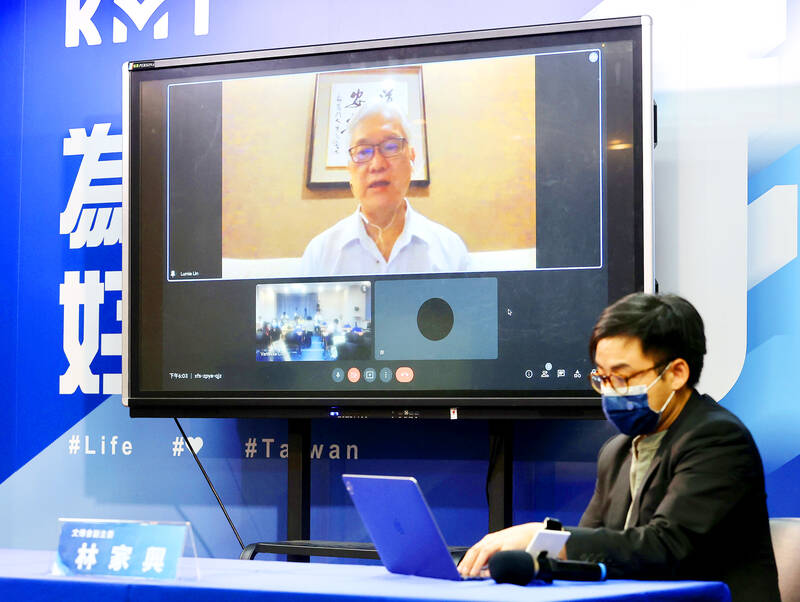Chinese Nationalist Party (KMT) Chairman Eric Chu (朱立倫) yesterday defended a controversial trip to China by party Vice Chairman Andrew Hsia (夏立言) as “brave,” even as Hsia faced protests upon his return to Taiwan.
The timing of Hsia’s trip generated controversy, as the KMT delegation arrived in China on Aug. 10, six days after Beijing launched a high-pressure military and economic campaign against Taiwan following US House of Representatives Speaker Nancy Pelosi’s visit to Taipei from Aug. 2 to 3.
Chu said that Hsia and other members of the delegation were “very brave and determined,” and it was important to keep lines of communication open to prevent conflict.

Photo: CNA
Members of Taiwan Statebuilding Party on Saturday led a protest at the Taiwan Taoyuan International Airport upon Hsia’s arrival, holding signs saying that he was selling out Taiwan and demanding that Hsia and the members of his delegation be sent back to China.
During a virtual news conference held shortly after returning, Hsia said the trip across the Taiwan Strait was aimed at looking after the needs of Taiwanese living in China.
He said he used his meetings with Chinese officials to convey the concerns of the Taiwanese community in the country over Beijing’s military drills around Taiwan.
He told his hosts that the military exercises were not helpful to peaceful development, and that the vast majority of Taiwanese were uneasy, worried and dissatisfied with the drills, he said.
The Mainland Affairs Council said that Hsia was playing politics ahead of November’s local elections and that his visit played into Beijing’s “united front” efforts.

NATIONAL SECURITY THREAT: An official said that Guan Guan’s comments had gone beyond the threshold of free speech, as she advocated for the destruction of the ROC China-born media influencer Guan Guan’s (關關) residency permit has been revoked for repeatedly posting pro-China content that threatens national security, the National Immigration Agency said yesterday. Guan Guan has said many controversial things in her videos posted to Douyin (抖音), including “the red flag will soon be painted all over Taiwan” and “Taiwan is an inseparable part of China,” while expressing hope for expedited “reunification.” The agency received multiple reports alleging that Guan Guan had advocated for armed reunification last year. After investigating, the agency last month issued a notice requiring her to appear and account for her actions. Guan Guan appeared as required,

A strong cold air mass is expected to arrive tonight, bringing a change in weather and a drop in temperature, the Central Weather Administration (CWA) said. The coldest time would be early on Thursday morning, with temperatures in some areas dipping as low as 8°C, it said. Daytime highs yesterday were 22°C to 24°C in northern and eastern Taiwan, and about 25°C to 28°C in the central and southern regions, it said. However, nighttime lows would dip to about 15°C to 16°C in central and northern Taiwan as well as the northeast, and 17°C to 19°C elsewhere, it said. Tropical Storm Nokaen, currently

‘NATO-PLUS’: ‘Our strategic partners in the Indo-Pacific are facing increasing aggression by the Chinese Communist Party,’ US Representative Rob Wittman said The US House of Representatives on Monday released its version of the Consolidated Appropriations Act, which includes US$1.15 billion to support security cooperation with Taiwan. The omnibus act, covering US$1.2 trillion of spending, allocates US$1 billion for the Taiwan Security Cooperation Initiative, as well as US$150 million for the replacement of defense articles and reimbursement of defense services provided to Taiwan. The fund allocations were based on the US National Defense Authorization Act for fiscal 2026 that was passed by the US Congress last month and authorized up to US$1 billion to the US Defense Security Cooperation Agency in support of the

PAPERS, PLEASE: The gang exploited the high value of the passports, selling them at inflated prices to Chinese buyers, who would treat them as ‘invisibility cloaks’ The Yilan District Court has handed four members of a syndicate prison terms ranging from one year and two months to two years and two months for their involvement in a scheme to purchase Taiwanese passports and resell them abroad at a massive markup. A Chinese human smuggling syndicate purchased Taiwanese passports through local criminal networks, exploiting the passports’ visa-free travel privileges to turn a profit of more than 20 times the original price, the court said. Such criminal organizations enable people to impersonate Taiwanese when entering and exiting Taiwan and other countries, undermining social order and the credibility of the nation’s